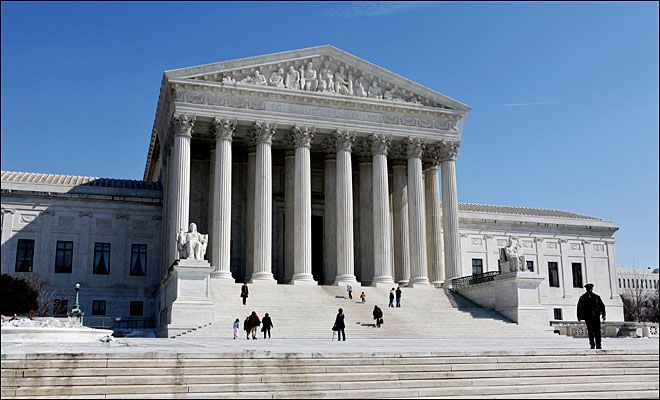SCOTUS Watch …

The Supreme Court will be in session this morning for orders starting at 9:30 Eastern. The two remaining opinions will be released starting at 10:00am. SCOTUSblog will liveblog at this link today starting at 9:15 Eastern .
SCOTUSblog: October 2013 Term, cases pending
DECISION: Harris wins her suit but Abood not overturned. PDF decision from SCOTUS
Harris v. Quinn, No. 11-681 [Arg: 1.21.2014]
Issue(s): (1) Whether a state may, consistent with the First and Fourteenth Amendments to the United States Constitution, compel personal care providers to accept and financially support a private organization as their exclusive representative to petition the state for greater reimbursements from its Medicaid programs; and (2) whether the lower court erred in holding that the claims of providers in the Home Based Support Services Program are not ripe for judicial review.
~
DECISION: Hobby Lobby wins right to discriminate against its female employees. PDF decision from SCOTUS
Conestoga Wood Specialties Corp. v. Sebelius, No. 13-356 [Arg: 3.25.2014]
Issue(s): Whether the religious owners of a family business, or their closely held, for-profit corporation, have free exercise rights that are violated by the application of the contraceptive-coverage mandate of the Affordable Care Act.
Sebelius v. Hobby Lobby Stores, No. 13-354 [Arg: 3.25.2014]
Issue(s): Whether the Religious Freedom Restoration Act of 1993 (RFRA), 42 U.S.C. §§ 2000bb et seq., which provides that the government “shall not substantially burden a person’s exercise of religion” unless that burden is the least restrictive means to further a compelling governmental interest, allows a for-profit corporation to deny its employees the health coverage of contraceptives to which the employees are otherwise entitled by federal law, based on the religious objections of the corporation’s owners.
Commentary below …
Analysis and Opinion …
SCOTUSblog on Hobby Lobby The link is to all the documents and commentary on the case including the “Plain English” explanation by Amy Howe.
To understand the eventual ruling, it is important to know what they are ruling on. From Lyle Denniston:
Federal appeals courts ruled in conflicting ways. The U.S. Court of Appeals f0r the Tenth Circuit decided that Hobby Lobby was likely to win its challenge because, even though it is a profit-making business, it can, indeed, act according to faith principles. The U.S. Court of Appeals for the Third Circuit decided that neither the company, Conestoga Wood Specialties, nor its owners could claim First Amendment religious rights – because, it found, the corporation is incapable of doing so, and because the owners had chosen the corporate form for their business and it stands apart from their personal interests.[…]
The Court has not been asked to strike down any part of the law, and it almost certainly won’t volunteer to do so. All that is at issue is who must obey the contraceptive mandate.
My reading of this is that if the court votes to affirm the ruling of the 3rd Circuit and reverse the ruling of the 10th Circuit, it is a win for those who believe that the religious exemptions should not be expanded to include the shareholders of for-profit corporations and their corporations. If the court votes to affirm the ruling of the 10th Circuit and reverse the 3rd Circuit, it is a loss.
SCOTUSblog on Harris v Quinn. The link is to all the documents and commentary on the case including the argument analysis by Lyle Denniston
The precedent whose philosophical foundation was up for discussion – and that Verrilli urgently sought to be reaffirmed – is Abood v. Detroit Board of Education. That 1977 decision was the Court’s first major ruling to embrace public employee unionism and the idea that a single union should represent a public unit of workers and all employees – union members or not – would have to support its core bargaining activities by paying dues.[…]
The home-care workers, [the lawyer for the National Right to Work Legal Foundation] contended, were being coerced into financial support for a public employee union that wants to “petition the government” in their place, but in ways that some of those workers might well oppose.
The Quinn in the case is Pat Quinn, governor of Illinois, the employer of Harris, the woman who has sought to not have to pay union dues in her job as a home health care provider. The 7th Circuit ruled that the case was not ripe for judicial review and would not take the case. The petitioner sought a ruling from the Supreme Court. A ruling for Harris could remand the case to the 7th Circuit for review or the court could rule on its own that public sector unions cannot require government employees to pay dues. There is a lot of hair on fire analysis about this case being the “end of unions” and the “end of the Democratic Party”. It would be better to wait and look at the ruling. The National Right to Work group, which has powerful right-wing sponsors and friends on this court, will likely prevail in this case. But what it means depends on how the decision is written.
[poll id=”
183
“]
42 comments